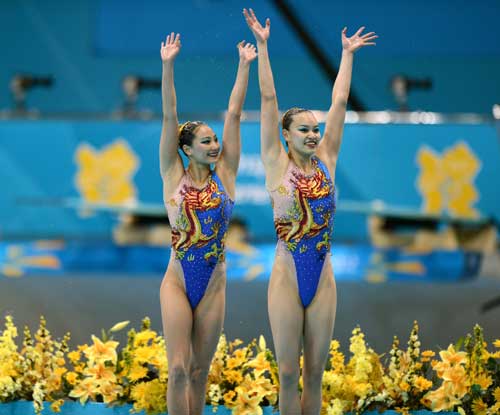
China clinches first Olympic medal in synchronized swimming deut
Xinhua, August 8, 2012
-

Chinese duo Huang Xuechen (R) and Liu Ou bagged a bronze medal in deut event of synchronized swimming at London Olympics on Tuesday. [Yang Lei/Xinhua] Chinese duo Huang Xuechen and Liu Ou bagged a bronze medal in deut event of synchronized swimming at London Olympics on Tuesday, marking the first-ever Olympic medal for the country in the sport which has long been dominated by Russia.
Huang and Liu won the bronze medal with a total of 192.87 points from Sunday's technical routine and Tuesday's free routine final, only a slight 0.03 point behind Spanish pair Ballestero Carbonell and Andrea Fuentes Fache who bagged silver.
The gold medal went to undisputed Russian pair Natalia Ishchenko and Svetlana Romashina, who led both the technical routine and free routine final with sizeable scores over competitors.
Wearing costumes emblazoned with golden dragons, Huang and Liu dove in the water to perform their dragon-themed routine to a powerful music piece of "Dragon", collecting 96.77 points as third place in the free routine final.
The Chinese were 0.1 point ahead of Spanish duo after Sunday's technical routine, but were dropped from second to third place after the free routine final in which the Spanish staged a near-perfect performance to outshine Chinese with an overall 0.03 point.
It is a historic Olympic medal China grabs from deut event of synchronized swimming.
Four years ago in Beijing, Chinese twins Jiang Tingting and Jiang Wenwen were expected for medal in the deut competition, but failed after making an error towards the end and only finished fourth.
Liu and Huang, mentored by Japanese legend synchro swimming coach Masayo Imura, were among the members to clinch a bronze medal in team event in Beijing.
"We got huge improvement compared to what we had achieved at previous Games. We got everything we could from the training experience," said Liu, also silver medalist in the free routine at the 2011 Shanghai World Championships.
Imura said the bronze medal was of great significance to China's synchronized swimming.
"We finally built our status within the top three in synchronised swimming with this medal," she said, adding it would be a great boost to the team event as well as the development of China's synchronized swimming career.
Regarding the gap with Russia and Spain, Imura said the Russian have distinct advantages in their degree of difficulties while Spanish swimmers were superior in their synchronization.
As for China, she said the training of Chinese synchronized swimmers focused on their physical strength and positions in water, quite different from the ways of Russia and Spain.
Synchronized swimming is far from being a popular sport in China, but the swimmers took on demanding training program to better their performance. They swim an average of 4,000 meters every day and have to master acrobatic stunts, ballet movement while work hard to exercise great breath control under water. Sometimes they have to eat three times more than the normal dietary portions to increase strength and stability in water.
The rigorous training benefited the Chinese synchronized swimmers, and they embarked on a faster lane when the Japanese coach Masayo Imura came to their assistance at the end of 2006. The 62-year-old Imura has tutored Japan's synchro swimming team since 1978, helping her swimmers win eight Olympic medals over the past 30 years.
"We hope to give special thanks to our coach. We won't be here today without her. She has brought huge differences for the Chinese team," Liu said.
Synchronized swimming made its Olympic debut in 1984. The sport includes duet and team competitions and both formats include a technical and free routine. It is a subjectively judged sport, and it takes time to win recognition. In the last 28 years as an Olympic sport, worldwide, it has been dominated by Russia, and in Asia, Japan has frequently been the No. 1. However, Japan, bronze medalist at Beijing Olympics, was shut of of a medal with a fifth place in the deut event at London Olympics.